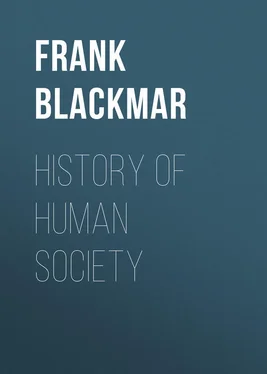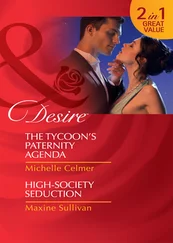Frank Blackmar - History of Human Society
Здесь есть возможность читать онлайн «Frank Blackmar - History of Human Society» — ознакомительный отрывок электронной книги совершенно бесплатно, а после прочтения отрывка купить полную версию. В некоторых случаях можно слушать аудио, скачать через торрент в формате fb2 и присутствует краткое содержание. ISBN: , Жанр: foreign_antique, foreign_prose, на английском языке. Описание произведения, (предисловие) а так же отзывы посетителей доступны на портале библиотеки ЛибКат.
- Название:History of Human Society
- Автор:
- Жанр:
- Год:неизвестен
- ISBN:http://www.gutenberg.org/ebooks/30610
- Рейтинг книги:3 / 5. Голосов: 1
-
Избранное:Добавить в избранное
- Отзывы:
-
Ваша оценка:
- 60
- 1
- 2
- 3
- 4
- 5
History of Human Society: краткое содержание, описание и аннотация
Предлагаем к чтению аннотацию, описание, краткое содержание или предисловие (зависит от того, что написал сам автор книги «History of Human Society»). Если вы не нашли необходимую информацию о книге — напишите в комментариях, мы постараемся отыскать её.
History of Human Society — читать онлайн ознакомительный отрывок
Ниже представлен текст книги, разбитый по страницам. Система сохранения места последней прочитанной страницы, позволяет с удобством читать онлайн бесплатно книгу «History of Human Society», без необходимости каждый раз заново искать на чём Вы остановились. Поставьте закладку, и сможете в любой момент перейти на страницу, на которой закончили чтение.
Интервал:
Закладка:
Modern Civilization Includes Some Fundamentals . – As applied at different periods of the world's progress and as a representation of different phases of life, civilization means more to-day than ever before; its ideal is higher, its conception broader. In the modern, accepted sense it includes (1) a definite knowledge of man and nature . The classified knowledge of science and philosophy and all phases of the history of man socially and individually are important in estimating his true progress. All forms of thought and life are to be estimated in considering the full meaning of the term. It also includes (2) progress in art . While science deals with principles, art deals with rules of action. Science gives classified knowledge, while art directs to a practical end. Art provides definite plans how to operate. If these plans are carried out, the field of practice is entered. In its broadest conception art includes the making and the doing, as well as the plan. The fine arts and the industrial or practical arts, in all of their varied interests, are included in art as a factor in civilization. This category should include the highest forms of painting, poetry, sculpture, and music, as well as the lowest forms of industrial implements.
Civilization includes (3) a well-developed ethical code quite universally observed by a community or nation. The rule of conduct of man toward himself and toward his fellows is one of the essential points of discrimination between barbarism and civilization. While ethical practice began at a very early period in the progress of man, it was a long time before any distinct ethical code became established. But the completed civilization does not exist until a high order of moral practice obtains; no civilization can long prevail without it. Of less importance, but of no less binding force, is (4) the social code , which represents the forms and conventionalities of society, built, it is true, largely upon the caprices of fashion, and varying greatly in different communities, yet more arbitrary, if possible, than the moral code. It considers fitness and consistency in conduct, and as such is an important consideration in social usage and social progress. In Europe it has its extreme in the court etiquette; in America, in the punctiliousness of the higher social classes of our large cities. But it affects all communities, and its observance may be noted in rural districts as well as in the city population.
The mores, or customs, of man began at a very early time and have been a persistent ruling power in human conduct. Through tradition they are handed down from generation to generation, to be observed with more or less fidelity as a guide to the art of living. Every community, whether primitive or developed, is controlled to a great extent by the prevailing custom. It is common for individuals and families to do as their ancestors did. This habit is frequently carried to such an extent that the deeds of the fathers are held sacred from which no one dare to depart. Isolated communities continue year after year to do things because they had always done so, holding strictly to the ruling custom founded on tradition, even when some better way was at hand. A rare example of this human trait is given by Captain Donald MacMillan, who recently returned from Arctic Greenland. He said: "We took two ultra-modern developments, motion pictures and radio, direct to a people who live and think as their ancestors did two thousand years ago." He was asked: "What did they think?" He replied: "I do not know." Probably it was a case of wonder without thought. While this is a dominant force which makes for the unity and perpetuity of the group, it is only by departure from established tradition that progress is made possible.
Civilization involves (5) government and law . The tribes and nations in a state of barbarism lived under the binding influence of custom. In this period people were born under status , or condition, not under law. Gradually the old family life expanded into the state, and government became more formal. Law appeared as the expression of the will of the people directly or indirectly through their representatives. True, it may have been the arbitrary ruling of a king, but he represented the unity of the race and spoke with the authority of the nation. Law found no expression until there was formed an organic community capable of having a will respecting the control of those who composed it. It implies a governing body and a body governed; it implies an orderly movement of society according to a rule of action called law. While social order is generally obtained through law and government, such is the practice in modern life that the orderly association of men in trade and commerce and in daily contact appears to stand alone and to rise above the control of the law. Indeed, in a true civilization, the civil code, though an essential factor, seems to be outclassed by the higher social instincts based on the practice of social order.
(6) Religion must take a large place as a factor in the development of civilization. The character of the religious belief of man is, to a certain extent, the true test of his progressive nature. His faith may prove a source of inspiration to reason and progressive life; it may prove the opposite, and lead to stagnation and retrogression. Upon the whole, it must be insisted that religious belief has subserved a large purpose in the economy of human progress. It has been universal to all tribes, for even the lowest have some form of religious belief – at least, a belief in spiritual beings. Religious belief thus became the primary source of abstract ideas, and it has always been conducive to social order. It has, in modern times especially, furnished the foundation of morality. By surrounding marriage with ceremonies it has purified the home life, upheld the authority of the family, and thus strengthened social order. It has developed the individual by furnishing an ideal before science and positive knowledge made it possible. It strengthened patriotic feeling on account of service rendered in supporting local government, and subjectively religion improved man by teaching him to obey a superior. Again, by its tradition it frequently stifled thought and retarded progress.
Among other elements of civilization must be mentioned (7) social well-being . The preceding conditions would be almost certain to insure social well-being and prosperity. Yet it might be possible, through lack of harmony of these forces, on account of their improper distribution in a community, that the group might lack in general social prosperity. Unless there is general contentment and happiness there cannot be said to be an ideal state of civilization. And this social well-being is closely allied to (8) material prosperity , the most apparent element to be mentioned in the present analysis. The amount of the accumulation of the wealth of a nation, its distribution among the people, and the manner in which it is obtained and expended, determine the state of civilization. This material prosperity makes the better phases of civilization possible. It is essential to modern progress, and our civilization should seek to render it possible for all classes to earn their bread and to have leisure and opportunity for self-culture.
The mastery of the forces of nature is the basis for man's material prosperity. Touching nature here and there, by discovery, invention, and toil, causing her to yield her treasures for his service, is the key to all progress. In this, it is not so much conflict with nature as co-operation with her, that yields utility and eventually mastery. The discovery and use of new food products, the coal and other minerals of the earth, the forests, the water power and electric power, coupled with invention and adaptability to continually greater use, are the qualifying opportunity for advancement. Without these the fine theories of the philosopher, exalted religious belief, and high ideals of life are of no avail.
Читать дальшеИнтервал:
Закладка:
Похожие книги на «History of Human Society»
Представляем Вашему вниманию похожие книги на «History of Human Society» списком для выбора. Мы отобрали схожую по названию и смыслу литературу в надежде предоставить читателям больше вариантов отыскать новые, интересные, ещё непрочитанные произведения.
Обсуждение, отзывы о книге «History of Human Society» и просто собственные мнения читателей. Оставьте ваши комментарии, напишите, что Вы думаете о произведении, его смысле или главных героях. Укажите что конкретно понравилось, а что нет, и почему Вы так считаете.












